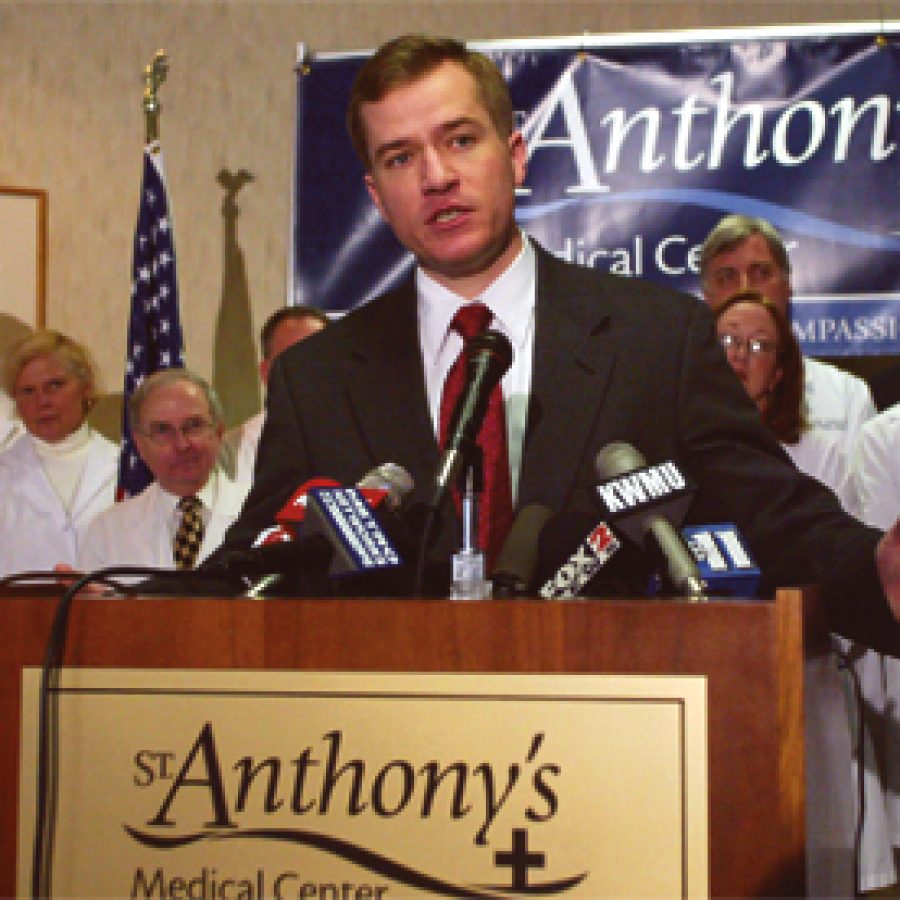By SCOTT MILLER
Staff Reporter
Gov. Matt Blunt said Missouri residents should be the checks and balances on education funding, not the judicial system.
While visiting St. Anthony’s Medical Center last week to promote tort reform, the Republican governor said he supported a proposed constitutional amendment that would exclude the courts from the education-funding conversation.
If approved by voters, the amendment could squash a lawsuit filed by the Committee for Educational Equality, which represents nearly 250 school districts. The suit contends the state’s current funding formula is unconstitutional because aid is not distributed equitably or adequately.
“I don’t think courts should impose tax increases,” Blunt said. “Courts shouldn’t be involved in school funding. It should be between the governor and the elected representatives of the people.”
When asked about the potential to re-move a democratic check and balance on governmental branches, Blunt said, “The ultimate check and balance is the Missouri voters. If they’re not happy with the school funding, then elect new members of their General Assembly.”
But critics worry the measure would allow the dominant out-state representation in the Legislature to prevent more money from ever coming to such “hold-harmless” school districts as Lindbergh and Mehlville, which have received the same amount of state aid from the formula since its in-ception in 1993. Lindbergh and Mehlville are members of the Coalition to Fund Excellent Schools, which represents about 70 school districts.
A ruling last summer allowed the Coalition to Fund Excellent Schools to intervene in the Committee for Educational Equality lawsuit. While the Coalition to Fund Ex-cellent Schools supports the pending lawsuit, it disagrees with some of the changes the Committee for Educational Equality is pushing.
Pat Lanane, Lindbergh’s assistant superintendent for finance and the district’s chief financial officer, questioned the in-tent of the constitutional amendment, saying it could stifle attempts to equalize state funding and be a detriment to the education of children.
“We think that (the state’s education-funding formula) is unconstitutional for two reasons: One, because it is unequitable in the way it distributes funding to kids, and two, it is inadequately funded overall. Are they (sponsors of the amendment) saying: ‘We don’t care if funding is equitable for kids.’ I think that they sort of are,” Lanane told the Call. “You wonder what the motivation was to file something to keep the courts from hearing on whether or not the kids are re-ceiving adequate resources for education.”
The proposed amendment, Senate Joint Resolution 18, states, “The power to determine public school funding shall exclusively be the province of the people’s elected representatives in the general assembly and their governor. The power to determine public school funding shall not fall within the province of the judiciary.”
Lawmakers are considering revamping the formula this session, a commitment of Blunt’s. The task is quite daunting, however, and removing the court case that could force a change in the formula could make the task even harder.
The current formula is more favorable for out-state districts because they have lower tax bases, meaning they receive more state aid. Changing the formula could mean shifting some aid from poor to rich districts, a particularly tough sale when some districts, such as Clayton and Ladue, spend about $13,000 per pupil while some out-state districts barely muster $5,000 per pupil.
And while many schools districts argue the formula is inadequately funded, the state struggles to increase education funding each year. This year, the governor proposes a $170 million increase for Mis-souri’s 524 school districts. Lindbergh and Mehlville won’t see any of the money if the formula doesn’t change.
The amendment would need legislative and voter approval. It is pending in the Senate.





















